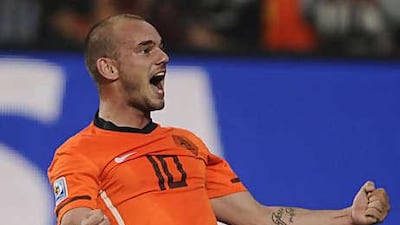When Wesley Sneijder's cross found its way, via Felipe Melo's head, into the Brazil net and his close-range header defeated Julio Cesar, it was an action replay of sorts. For the second time in a little over two months, the best side in the world, or so most supposed, were eliminated by a team influenced by Sneijder. First Barcelona in the Champions League semi-final, also featuring a goal from the Dutchman; then Brazil in the World Cup quarter-final. Sneijder's Inter Milan went on to win Europe's premier club competition. Should his Holland go on to capture the global game's greatest prize, it will complete an astonishing season.
Rewind 11 months and the notion of Sneijder as one of the sport's dominant figures was implausible. He was talented, yes, but essentially unused. He had played only 202 minutes in Holland's immaculate qualifying campaign and, while his club conducted a shameless quest to unite the most glamorous players on the planet, he was surplus to requirements. With hindsight, it is faintly ridiculous to think that there was talk of a move to Aston Villa, the English Premier League side.
That was at the start of a year that has been an exercise in embarrassment for Real Madrid. Sneijder and Arjen Robben, the men sacrificed to bring in Kaka and Cristiano Ronaldo, were respectively the Champions League's outstanding attacking midfielder and most devastating winger. Sneijder's Inter and Robben's Bayern Munich contested the Champions League final at the Bernabeu, the former supplying Diego Milito with the first of his match-winning pair of goals.
It completed a historic treble for Inter. Real's response was to hire the orchestrator, Jose Mourinho. But his masterstroke had been to pluck Sneijder from Real's reserves and install him as the creative fulcrum of the Nerazzurri. He now fulfils the same function for the Oranje; Rafael van der Vaart, who had the playmaker's role in Euro 2008 when Sneijder started on the left, is now a bit-part player at Real and confined first to the flank and then the bench. It is a role reversal and an advertisement of the merits of leaving the Bernabeu.
So, too, is Robben's brilliance. One Brazilian, Felipe Melo, was dismissed for stamping on him on Friday; another, Michel Bastos, was fortunate not be expelled for a series of fouls. Today he encounters a Uruguayan defence lacking its first-choice left-back, the suspended Jorge Fucile. For Sneijder, the objective is to evade the tireless working and industrious anchor midfielders Diego Perez and Egidio Arevalo.
Yet it is a familiar task: his stunning shot defeated Japan, among the most defensively disciplined teams in the competition. His late strike proved decisive against the determined Slovakians. And, much as Brazil imploded, the blend of effort and invention Sneijder and Robben offered contributed to a comeback of seismic proportions. It provided an unexpected, added benefit to the match-winner. As Fifa attributed Holland's first goal, originally debited to Felipe Melo, to Sneijder asw well, he now has four, placing him only one strike behind the leader in the battle for the Golden Boot, David Villa of Spain.
In each of the past 11 World Cups, the top scorer has been a striker; not since 1962, when Leonel Sanchez, the Chilean winger, and the Brazilian immortal, Garrincha, were among six to share it, has any player with duties elsewhere on the pitch taken the attackers' honours. It is a sign of a stellar month in a superlative year. After providing the inspiration for the all-conquering Inter, should Sneijder add the World Cup to the Champions League, Coppa Italia and Serie A scudetto, he would be the outstanding candidate for World Player of the Year.
As he lines up against Uruguay tonight, then, Sneijder is two games away from humiliating Real again. They normally attempt to sign the men recognised as the planet's foremost footballer. Yet in Holland's distributor-in-chief, they may have sold him. sports@thenational.ae


